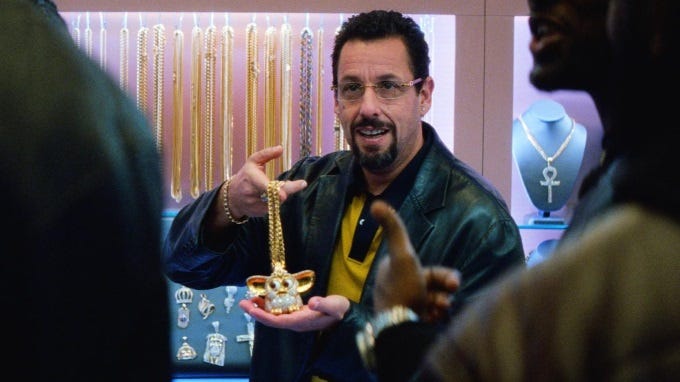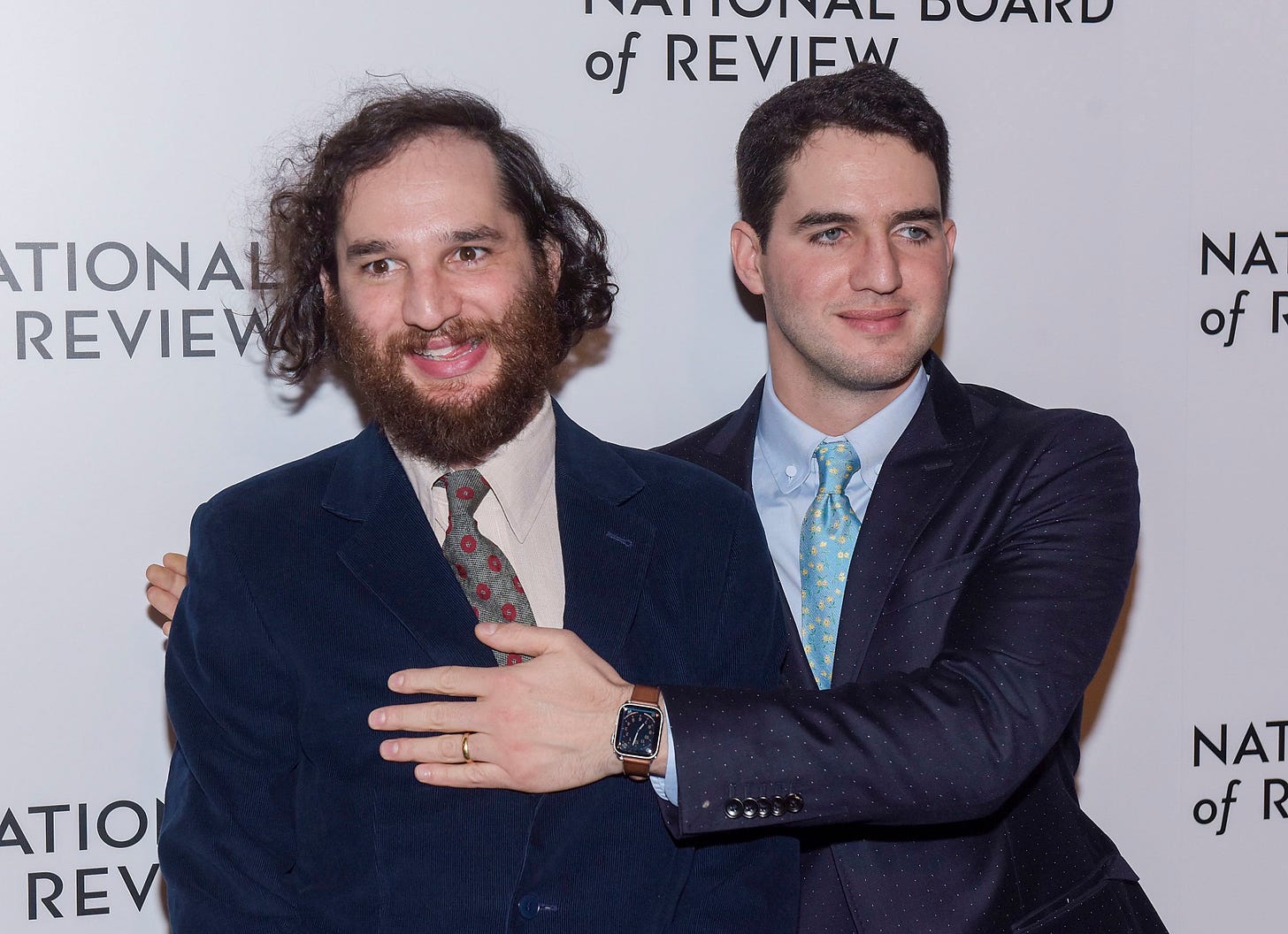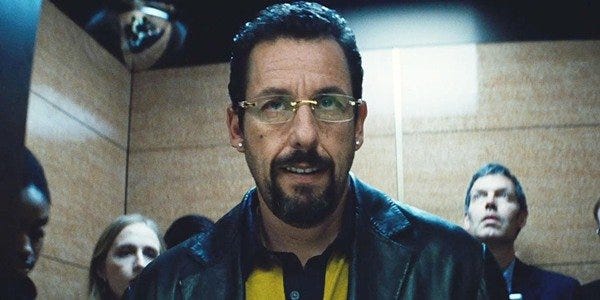Right now, as I write this, I’ve hit play again on Uncut Gems – I reckon it’s one of the best, smartest, most exhilarating and intense films I’ve maybe ever seen. And I’ve been needing to rewatch it – but at the same time it has stayed with me since first viewing.
There’s so much in it. So much to discuss.
First off there’s Daniel Lopatin’s soundtrack – which is incredible and cuts through the movie, and unlike many pervasive film scores it’s not just something to absorb during the watching; it plays well on its own – in fact you’ll see from my review there in that link above that the music became a firm favourite too; helps, perhaps, that I’ve long been following Lopatin’s main gig as Oneohtrix Point Never.
Then there’s Adam Sandler. You don’t like him. But you will in this. You should. You should at the least give him a chance. He’s been good in other things by the way. Part of what makes him so infuriating when he’s dumbing it right down to make tens of millions for his other hundreds of millions is how fucking good he can be.
In Uncut Gems, Sandler is at career best. And he’s one of the all-time horrid characters. So if you really don’t like him, you can take solace in the fact that he’s playing a ghastly creation.
The film was made by The Safdie Brothers. They’d made other movies – including a ton of shorts, but they really turned heads with 2017’s Good Time. I saw that as Dog Day Afternoon recut amongst millennial angst and the pressures of the steely-grey world of today, an actual marvel of low/ish-budget indie filmmaking. Somehow these brothers can tap right into the world of the best 1970s greasy, grimy, sleazy drama – but have used that starting point to launch their own filmmaking voice. It’s the same with Uncut Gems.
Back to the “poisoned chalice” of the very winning Adam Sandler performance; this can mean some people will not want to take the film at all seriously, and that others will be amazed Sandler can do anything straight. Both responses are a bit silly – he’s been turning out good to pretty-great ‘serious’ roles over the last twenty years, first getting notices for Punch Drunk Love and a little later Funny People – but if you know where to look you’ll also have found Reign Over Me and The Meyerowitz Stories among others. And if you never wanted to look – nor ask, that’s also okay. But it really shouldn’t impact your viewing of this film.
Sandler is Howard Ratner, a Jewish-American gambling addict and petty-con jeweller. He’s in large to some goons due to unwise sports betting so he doubles down by involving a separate set of thugs. His brother-in-law is one of the loan-sharks he’s in hock to, his wife is estranged, his girlfriend is enraged and Ratner – think about the first syllable of that surname – just keeps finding new ways to bury himself down in debt and bad decisions. He’s so utterly unlikeable that he’d be reason enough for a person to not watch this film. But the performance by Sandler is compelling.
No family outing – or celebration – is safe with Howard Ratner’s track-record a noose around the neck of all affiliated.
Far more infuriating than Ratner’s bad decisions – which includes taking bets on Boston Celtics basketball star Kevin Garnett (played by the real Garnett) using the collateral of his Championship ring which was a type of down-payment on the titular black opal – is the fact that everyone talks over one another, and the film’s jittery, uncomfortable vibe does everything it can to shut you out for about the first 45 minutes.
It’s a rare piece of art – an uncut gem if you will – that is totally okay with shutting you out, not bothered to lose its audience in the pursuit of excellence.
The Safdie brothers are showing that in their shorts and feature films. They care about their vision and won’t compromise.
Uncut Gems is claustrophobic, intense, infuriating and – eventually – it is utterly captivating.
To fully unpack what happens in this movie is of course to spoil it – but the ratcheting of tension and the mood created, the feeling of it being such an original piece of work (with some 70s-vibe touchstones of course) would be reason enough to stick with it. In the end the payoff is sublime, and of course heart-breaking.
This is a film about the absurdity, rush, tension, frustration and futility of addiction. The thrill. The despair. The hitting out at hope and the hopelessness of forever needing to hit (or a hit). It is a film about people being bothered by their unhappiness but unable to see that their actions further inveigle them.
Sandler is mesmerising – no doubt. But so too is the dynamite and dynamic support cast including a mix of heavy-hitting legends and first-timers. Eric Bogosian as brother-in-law loan-shark Arno is of course perfect in the sort of role he eats for a between-meal snack, getting his real fill chewing scenery elsewhere, and Judd Hirsch’s is a sublime cameo as Howard’s father-in-law. The women in Ratner’s life, that would be better off not being in his life, are brilliant character studies thoughtfully sketched by the safe hands of multi-talent Idina Menzel (wife, Dinah) and total newcomer Julia Fox (mistress and employee, Julia De Fiore). If you can’t play yourself then you maybe you cannot play anyone – but Garnett is good as his in-season NBA superstar self; so good that we might expect to see him shining elsewhere as a result.
All of these actors – and more besides – are great. But they’ve been handed the keys to the kingdom with this script and with these writer-producer-director wunderkinds.
The Safdies made a short film starring Sandler straight after wrapping Uncut Gems. It was fun, a bit weird, another great examination of that rage that seems to motivate Sandler’s greatest performances.
The Safdies will go on to many other great things – but for right now this is their masterpiece. And a brilliant, beguiling, beautiful film that is a tone-poem, ode in part to early/mid Scorsese and perhaps particularly the incredible run of films across the seventies decade by John Cassavetes.
The greatest thing about this film – outside of the performances, the script, the score – is the voyeuristic placement of the audience. We’re there, almost sitting atop the camera, so close that it’s almost a magic trick. This scripted drama with big name actors starts to almost feel like the darkest, realest reality TV. Or something we shouldn’t actually be watching. That’s why the tone is one of unease. And that’s the genius-stroke. That’s the ultimate selling point.








Inveigle - such a good word. Good review too, I'm keen to see it now.
Great review. The Cassavetes reference is spot on